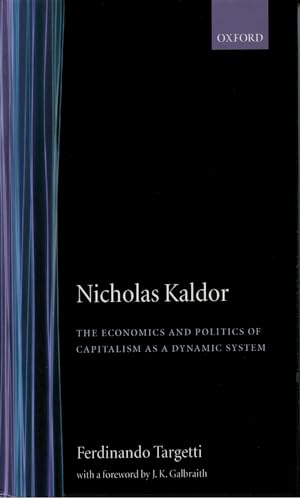9780198283485 - Nicholas Kaldor: The Economics and Politics of Capitalism as a Dynamic System von Targetti, Ferdinando (4 Ergebnisse)
FeedbackSuchfilter
Produktart
- Alle Product Types
- Bücher (4)
- Magazine & Zeitschriften (Keine weiteren Ergebnisse entsprechen dieser Verfeinerung)
- Comics (Keine weiteren Ergebnisse entsprechen dieser Verfeinerung)
- Noten (Keine weiteren Ergebnisse entsprechen dieser Verfeinerung)
- Kunst, Grafik & Poster (Keine weiteren Ergebnisse entsprechen dieser Verfeinerung)
- Fotografien (Keine weiteren Ergebnisse entsprechen dieser Verfeinerung)
- Karten (Keine weiteren Ergebnisse entsprechen dieser Verfeinerung)
- Manuskripte & Papierantiquitäten (Keine weiteren Ergebnisse entsprechen dieser Verfeinerung)
Zustand
Einband
- alle Einbände
- Hardcover (4)
- Softcover (Keine weiteren Ergebnisse entsprechen dieser Verfeinerung)
Weitere Eigenschaften
- Erstausgabe (Keine weiteren Ergebnisse entsprechen dieser Verfeinerung)
- Signiert (Keine weiteren Ergebnisse entsprechen dieser Verfeinerung)
- Schutzumschlag (1)
- Angebotsfoto (1)
Sprache (1)
Preis
- Beliebiger Preis
- Weniger als EUR 20 (Keine weiteren Ergebnisse entsprechen dieser Verfeinerung)
- EUR 20 bis EUR 45
- Mehr als EUR 45
Gratisversand
Land des Verkäufers
Verkäuferbewertung
-
Nicholas Kaldor : the Economics and Politics of Capitalism as a Dynamic System.
Anbieter: Kloof Booksellers & Scientia Verlag, Amsterdam, Niederlande
EUR 26,95
Währung umrechnenEUR 5,50 für den Versand von Niederlande nach DeutschlandAnzahl: 1 verfügbar
In den WarenkorbZustand: very good. Foreword John Kenneth Galbraith. Oxford : Oxford University Press,1992. Orig. cloth binding. Dustjacket. xiv,402p. Index. - Nicholas Kaldor's thinking on economics is considered to have had great influence on British economic policy. This book traces the development of his thought, which underwent a remarkable evolution, from his membership of the Austrian neoclassical school to his embracing of radical Keynesianism. Condition : very good copy. ISBN 9780198283485. Keywords : ECONOMICS, Kaldor, Nicholas (1908-1986).
-
Nicholas Kaldor: The Economics and Politics of Capitalism as a Dynamic System
Anbieter: Anybook.com, Lincoln, Vereinigtes Königreich
EUR 32,48
Währung umrechnenEUR 6,45 für den Versand von Vereinigtes Königreich nach DeutschlandAnzahl: 1 verfügbar
In den WarenkorbZustand: Good. This is an ex-library book and may have the usual library/used-book markings inside.This book has hardback covers. In good all round condition. No dust jacket. Please note the Image in this listing is a stock photo and may not match the covers of the actual item,900grams, ISBN:0198283482.
-
Nicholas Kaldor: The Economics and Politics of Capitalism as a Dynamic System
Anbieter: Ria Christie Collections, Uxbridge, Vereinigtes Königreich
EUR 240,59
Währung umrechnenEUR 5,82 für den Versand von Vereinigtes Königreich nach DeutschlandAnzahl: Mehr als 20 verfügbar
In den WarenkorbZustand: New. In.
-
Nicholas Kaldor : The Economics and Politics of Capitalism as a Dynamic System
Verlag: Oxford University Press (UK) Nov 1992, 1992
ISBN 10: 0198283482 ISBN 13: 9780198283485
Sprache: Englisch
Anbieter: AHA-BUCH GmbH, Einbeck, Deutschland
EUR 319,92
Währung umrechnenKostenlos für den Versand innerhalb von/der DeutschlandAnzahl: 2 verfügbar
In den WarenkorbBuch. Zustand: Neu. Neuware - Nicholas Kaldor (1908-1986) was one of this century's most original economic thinkers. His influence on British economic policy was second only to that of Keynes. This book traces the development of Kaldor's thought which underwent a remarkable evolution from his membership of the Austrian neoclassical school to his embracing of radical Keynesianism. He was quick to grasp essential changes in economic reality and to forge analytical tools to explain them. Although he was innovative from 1938 onwards, much of Kaldor's seminal work belongs to a coherent body of research which made him, together with Joan Robinson and Michael Kalecki, the leading representatives of the post-Keynesian school, an outstanding critic of the neoclassical theory of equilibrium, growth and distribution, and a convinced opponent of the monetarist school. The book also shows how economic policy and political economy were closely connected in Kaldor's work. It was this that made Kaldor one of the most lucid and radical champions of the economic policies which, by blending political freedom with social justice, have been the outstanding feature of the great European tradition of social democracy.



